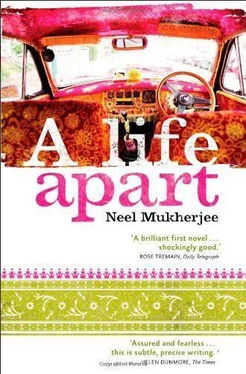Mr Roy Chowdhury has been open and frank about the rituals and observances his sisters-in-law practise, and has told me a considerable part of his, and their, family history. It appears that the older of the two widowed ladies, the one whom Bimala calls ‘Naw Jaa’, ‘jaa’ being the Bengali word for husband’s sister-in-law, was married off to Mr Roy Chowdhury’s brother, a good twelve years older than Mr Roy Chowdhury, when she was but a child of nine, the same age as the young Mr Roy Chowdhury himself at the time of this marriage. They grew up together, as two children, first as two friends in a family of adults, then the bond between them growing to that between a brother and a sister. When Mr Roy Chowdhury’s brother, the girl’s husband, died, leaving her a widow at the age of eleven, she had thrown herself into Vaishnavism as succour and consolation — shaving her head, observing extreme dietary laws, such as not eating or drinking after sunset, required by that strain of the Hindoo religion, immersing herself in fasts and prayers and rituals, seemingly in atonement for her sins, which, she was convinced, had caused her husband’s death. The bond between her and Mr Roy Chowdhury had only deepened although he had not succeeded in dissuading her from the more extreme aspects of her new religion. If she derives support or happiness from it, if it makes the burden of her tragedy easier for her, who am I to impose my will, he had said to me once, when I was expressing my reservations about the austerity of life for a woman so much younger than I am. Do you know, Violet, she feeds pigeons every morning, opening the shutters of the andarmahal verandah and throwing out handfuls of grain, in the belief that all those cooing birds are a collective incarnation of the little Lord Krishna?
The other sister-in-law, married to another of Mr Roy Chowdhury’s brothers, lost her husband after five years. It seems such misfortune dogs the poor women who marry into this family. She, too, is childless. The second brother’s death left Mr Roy Chowdhury as head of family, a role he fulfils with affection, love and a great deal of maturity, with conscientious attention to duty and to every member’s wishes and desires. It cannot be easy for him to sustain the roles of brother (for that is what he is to Bimala’s Naw Jaa), beloved brother-in-law and loving husband, all at once, certainly not when Bimala’s recent presence in the andarmahal has disrupted, I suspect, former stabilities and precedences. I am also of the opinion, and I haven’t mentioned this to anyone, apart from you, Violet, that Mr Roy Chowdhury’s gentle prevailing on the matter of Bimala’s introduction to the outside world, leaving her seclusion behind, has not been looked upon too kindly by the two other women. It must be difficult for Mr Roy Chowdhury to steer a balanced and peaceful path through a household of women.
But this is all idle surmise. I have more entertaining things to occupy my time here. Now that autumn has arrived, the fields are full of blossoming giant grass, which they call ‘kaash phul’ here. We, by which I mean Bimala, Mr Roy Chowdhury and I, sometimes go on boat rides on the Jamuna river in Shukshayor. The river is now quite mild, although a very brown colour, and the majhi sometimes sings as he rows us along, very plaintive songs in his cracked voice which make me feel extremely melancholic and long for something but I don’t know what. It is a very calm exercise: the boat moves along very slowly indeed on the surface of the water, rocking gently from side to side in such a manner as to induce sleepiness — I was afraid of this soft pitch and swell the first time — while Mr Roy Chowdhury reads poetry aloud to us: Keats and Wordsworth — his favourite — and at times Bengali poetry too. I too read aloud, but from Bengali books — even if I do say so myself, my proficiency in the Bengali language increases apace, thanks to Bimala’s expert guidance — graded books called
Sahaj Path
, which means Easy Reading, and simple folk tales written for children. Bimala is quite proud of her achievement in this reciprocal education of her tutor and companion. I can only wholeheartedly support this happy arrangement wherein I teach her English, among other things, and she instructs me in her language. I hope I’m not being immodest when I tell you that I can have a reasonable conversation with Bimala and her husband in their mother tongue, while Bimala goes from strength to strength every day — she read out ‘A slumber did my spirit seal’ last week, beautifully, I thought, only tripping up on the word ‘diurnal’ in the penultimate line, a word with which she is unfamiliar. We applauded heartily and she took great joy from this little achievement. It is such a sad little poem, we were quite overwhelmed, I can tell you, and I even thought I heard Mr Roy Chowdhury’s voice tremble ever so slightly as he explicated the meaning of the poem to Bimala.
Mr Roy Chowdhury has kindly allowed me the use of one of his two horses, a beautiful grey and white dappled gelding whose name is Pakshiraj, which he tells me is the name for the Bengali version of Pegasus, or indeed, any winged horse of myth or folklore. I also have the use of Mr Roy Chowdhury’s saees when I go riding and in this delectable weather, I do so quite often, sometimes in the early mornings, when the mist is still on the ground and on the rolling fields, and sometimes in the afternoons, when the delicate autumn light gilds everything orange and gold. It is one of life’s more unalloyed pleasures being able to ride for miles and miles, the wind in your face, leaving behind people, houses, habitations, hamlets here and there, just you, the steed and the rush of air and open country passing you by. I pass by rivers and fields, occasionally I ride through villages consisting of no more than a few straggling huts. Everywhere people are polite and friendly, and in our own village, Nawabgunj, a band of young men, whom I often see coming into the offices on the ground floor on, I assume, business to do with the zamindari, have taken to wishing me ‘Good morning, memsa’ab’, ‘Good evening, memsa’ab’ when they see me in the village when I go out to take the air or when I set out riding.
Another no small joy in this mild season is Tea on the lawn, or garden, I should rather say, of ‘Dighi Bari’. I have been teaching Bimala some of our customs and sometimes I let her practise these during Afternoon Tea on the grass with little folding tables, chairs, parasols. She usually pours for everyone and serves the sandwiches and cakes with such poise that I can tell Mr Roy Chowdhury feels quite proud of her, as I do, too, and no doubt, you would have done as well had you been here, dear Violet. It is at these Teas I miss you most. I speak about you to Bimala and Mr Roy Chowdhury, although it seems he has heard a lot about you and your work from notable Bengali worthies who are his friends and also from the Rajah of Cooch Behar. He always refers to you as ‘your eminent friend, Mrs Cameron, who does so much for our country.’ I feel very proud of you when he utters your name with such respect.
And now, dear Violet, you will scarcely believe your ears when I impart to you the next bit of information — I have finally embarked upon my book. I have drawn up a general plan for the disposition of the chapters, the distribution of ideas and the unfolding of the arguments in the first five chapters — there will be twelve in all — and, what is more, I have already started writing the first and the third. I have tentatively entitled it
Essay on the Rights of Women
. What do you think of the title? I miss your guiding intelligence, our numerous conversations and debates about many of the subjects, which will, no doubt, eventually find their way into the book. I miss your generosity with ideas, your willingness to discuss, correct, argue, modify. When shall we have the opportunity to do that again?
Читать дальше












